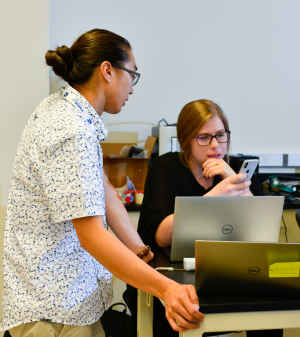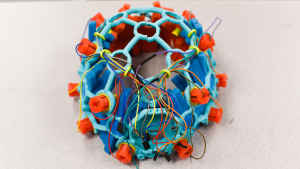
We’re in this together
Building ability and access through technology
Audio plays during this story.


In the driver’s seat
Jade’s bare feet dangle around her mother’s waist and her head rolls forward like a sleepy child’s.

But her giggle gives her away: Jade is very much awake and excited. Today, she is at Assistive Technology Partners at CU Denver learning how to drive a motorized wheelchair.

"I am Brenda Ruiz, and my daughter Jade is 5 years old. And we are here for our appointment to get a power wheelchair. Her personality is incredible. She is extremely independent. She has an infectious laugh. She loves Disney princesses. She loves playing with other kids her age. She loves being outdoors, and she is overall just a really happy kid."

When she was 3, Jade experienced a sudden loss of motor skills and muscle function. She was diagnosed with Krabbe’s Leukodystrophy, a rare genetic condition that affects her nervous system. She has been getting around in a stroller and manual wheelchair ever since.
But Jade was starting kindergarten this fall. It was time to put her in the driver’s seat.

"Jade having a motorized wheelchair will change the game essentially when it comes to school. She has overall lost so many of her abilities in such a short amount of time. And so having that motorized wheelchair gives back her independence and her control over her surroundings. I know that's very important for Jade."
Brenda Ruiz

"She's only 5, but she is very aware of her loss of control, and so this will be just a huge thing for her moving forward and growing and being able just...at school to keep up with other kids her age. I think that's going to be really important."
Brenda Ruiz

Jade’s co-pilots for the day are a well-loved pink rabbit with a cape and knickers she calls Super Bunny, and Brian Burne, an occupational therapist and assistive technology specialist at CU Denver.

Once strapped in, Jade’s hand wraps around the joystick of the motorized wheelchair.

"The University of Colorado, having this program in place, is incredible. It’s just been amazing to bring Jade here and work with these phenomenal staff members here, and they are so good to us…it’s just such a benefit to our family."
Brenda Ruiz
Lending a helping hand
A disability can happen to someone due to birth, injury, disease or aging.
In fact, one in four adults—61 million in the United States alone—have a disability that impacts major life activities, according to a report by the Centers for Disease Control and Prevention.

"At some point in their lives, most people will either have a disability or know someone who has a one," says Cathy Bodine, who first joined Assistive Technology Partners in 1996.
Bodine, who serves as executive director and an associate professor of bioengineering at CU Denver, is internationally recognized for her work in assistive technology.

Her take on the world is that people, with and without disabilities, all want the same basic things.
Bodine is inspired by the quote: "For people without disabilities, technology makes things easier. For people with disabilities, technology makes things possible."
Assistive Technology Partners uses innovative technology and engineering to help those living with disabilities, including sensory, cognitive, mobility and communication needs, access the world around them.
The program has thrived, thanks to a philanthropic partnership ATP has with Colorado’s construction industry.
For more than a decade, a group led by CU alumnus Bill Caile and his wife, Sara, has supported ATP through an annual event called Déjà Vu Rendezvous, attracting a kind of “who’s who” in the Colorado construction industry.
With both financial and in-kind contributions from this generous group—as well as support from both CU Denver's College of Engineering, Design and Computing and the dual-campus Department of Bioengineering shared between CU Denver and CU Anschutz—Assistive Technology Partners moved into a renovated space on campus in 2016.
Since 2008, efforts by Caile and his industry partners have raised over $2 million for Assistive Technology Partners, including funding for an endowed professorship, clinical support, a bioengineering endowment and a scholarship program.
Endowed professorships are crucial to improving CU’s intellectual might. Innovative academic leaders attract the best and brightest students and create opportunities for brilliant ideas to launch, grow and flourish.
It's paying off: Starting in late 2019, ATP will be designated as the Center for Inclusive Design and Engineering.

David Pak, left, was among a group of graduate students who received fellowships this year to research ways technology can help those living with cognitive disabilities.
Since 2001, the Coleman Institute for Cognitive Disabilities has sustained fellowships for graduate students across CU’s four campuses, thanks to a private endowment and annual contributions by donors.

"I believe that the population is widely underserved, and it's even more kind of eye-opening... to just hear and see different stories of people with physical disabilities or cognitive disabilities overcoming all these challenges."
David Pak, CU student
Led by Bodine, the students worked with clients with mild to moderate traumatic brain injuries, or TBIs. Clients were asked to shop for specific grocery items or stock shelves inside a mock warehouse on the CU Anschutz Medical Campus.

The students tested which method was more helpful to the clients:

A traditional pen and paper shopping list …

…or a mobile device that can read black and white QR codes on the floor.
Using software, the mobile device serves as a digital, real-time job coach. The client uses the mobile device to scan QR codes. The mobile device shows the client photos of the desired items and their location in the warehouse should they ever need help.

Human-inspired technology
Since its founding, Assistive Technology Partners has provided assistive technology information and services to more than 3 million people around the world.
The goal of ATP is to help people feel more confident and independent in all parts of their life through technology.

Technology can be something that helps you move.

Technology can be something that helps you think.

"To me, it's all about the human who needs or wants to accomplish a task, but they need to mediate that through the use of technology because they can't do it for whatever reason on their own. To me, it augments human behavior or human activity."
Cathy Bodine

Technology helps Tammy Burton, a business owner and mother of two, get the perfect fit for her wheelchair, which will help her avoid unnecessary medical costs and relieve pain.

"I really appreciate the independence that they can offer me. My life is very full and I need my wheels."
Tammy Burton, client

Technology helps CU Denver alumna Kalyn Heffernan choose a new wheelchair, so she can safely move about the city she loves.

"I'm a musician, an activist and an educator, and I'm all over the city. I do a lot. Everything that we do with disabilities is twice as hard and not typically built for us, so these kinds of places are super important. And having a team that's there to advocate on your behalf, but mostly let you advocate for yourself."
Kalyn Heffernan, client

Technology helps make a great day of kindergarten for Jade and Super Bunny.


